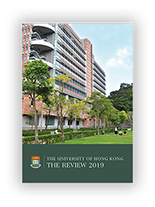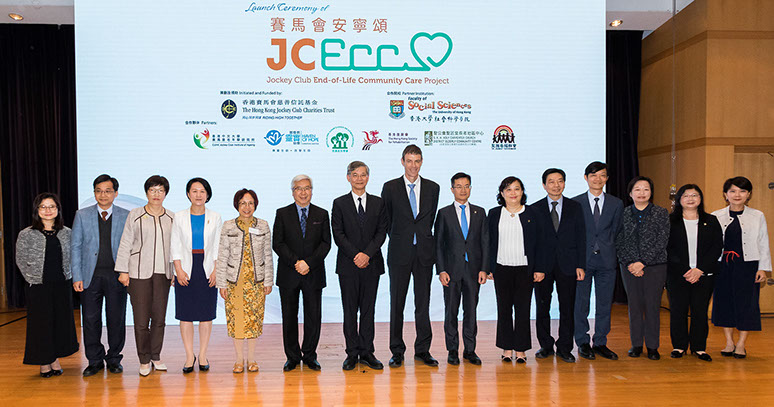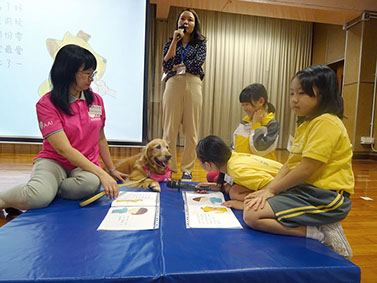Knowledge Exchange and Technology Transfer
2018_%20.png?crc=3873734352)
PDF Version
Past Issues
Vision and Mission
An Extract from
the University’s
Annual Accounts 2018–19
The University Profile
Officers of the University
The Court
Teaching and Learning
Research and Innovation
Knowledge Exchange and
Technology Transfer
Message from the
President and
Vice-Chancellor
E-Book

Community Care
HKU scholars have applied their expertise in the community to help organisations develop better services and new approaches and deepen public understanding about social and personal issues of concern.

The second phase of the Jockey Club End-of-Life Community Care Project kicked off in 2019 with the aim of strengthening the connection of the community with the medical care system and offering one more option for end-of-life care in Hong Kong.
Improving Life at the End
A project to improve end-of-life care has provided services to thousands of patients and healthcare workers and led to significant drops in hospitalisation and emergency services usage by terminal patients.
The three-year Jockey Club End-of-Life Community Care Project, led by Dr Amy Chow Yin-man of the Department of Social Work and Social Administration, was launched in 2016 to provide practical and psycho-social support to patients and their families. Capacity enhancement training has been provided to more than 10,000 healthcare professionals and 586 volunteers, and services to more than 5,000 elderly living at home with terminal illnesses and those living in 36 residential homes for the elderly.
The project reported that by 2018, patients living at home who received the services reported 18% less discomfort from their illness and worried 55% less about family matters. Their hospital stays were 12.5% shorter during the last six months of their lives than similar terminal cases from 2015, before the project was launched, and their use of emergency services was 11.6% lower. Similarly, service recipients in residential homes for the elderly reported 45.8% shorter hospital stays and 18.4% reduced use of emergency services during the last three months of their lives when compared to 2015.
The project also carried out public education to help break the taboo of talking about death and raise awareness of the need to discuss end-of-life matters. Two surveys found that public understanding about end-of-life care increased from 30% in 2016 to 39% in 2018 and more than two-thirds of respondents said quality of life would be more important than extension of life should they have a terminal illness. The success of the project has prompted the Jockey Club to extend funding to 2022.
SMART Approach to Family Services
The University’s School of Public Health (SPH) and the Technology-Enriched Learning Initiative (TELI) are joining forces to advance the use of information and communications technology (ICT) and develop ICT-related capabilities in family service centres operated by 12 non-government organisations (NGOs), which will enhance their services and promote family well-being in the community.
The Jockey Club SMART Family-Link Project involves creating a new computerised service management system (iConnect) for 26 integrated family service centres and integrated service centres that mostly still use a paper-based system. iConnect will reduce administrative work and release more resources for preventive programmes, improve access, broaden reach, reduce stigmatisation, and facilitate identification of at-risk families for early support and remedial services. To develop the system, the SPH and TELI have been working and co-learning with hundreds of staff from the NGO partners. Design and development started in 2018 in preparation for a soft launch at the end of 2019 involving six of the NGOs. The SPH, with TELI, will also apply big data analysis to help policymakers, NGOs and social workers better plan services, identify trends, predict needs and evaluate effectiveness.

The Jockey Club SMART Family-Link Project was set out to help family service centres enhance the quality and efficiency of their services by making effective use of information and communications technology and data analytics.
SPH and TELI are also developing and co-creating an e-platform with NGO partners, which will be the first of its kind in Hong Kong to provide frontline workers with easy access to online training (using mini-modules with mini-certificates), learning resources and experience-sharing opportunities.
The SMART Family-Link Project is expected to directly benefit about 75,000 individuals and about 1,000 social workers and hopefully serve as a model for other social services in Hong Kong. Public education activities and knowledge transfer, using Facebook and Family Portal, are also being carried out to raise awareness and knowledge on the themes of Smart Communication, Smart Parenting, Smart Emotion, Smart Coping and Smart Living Habits and will reach over 170,000 people.
Animal-assisted Projects to Promote Socio-emotional Health
Dr Paul Wong Wai-ching of the Department of Social Work and Social Administration has been leading the way in the region in studying and applying animal-assisted therapy to help children and young people achieve better well-being.
Initially, Dr Wong and his team worked with the Chinese Evangelical Zion Church Social Service Division to reach Hong Kong’s ‘hidden youth’ by offering sessions with trained therapy dogs. The programme helped entice the youths out of their rooms to get support from social workers. “The prospect of interacting with the animals was appealing to those who were otherwise reluctant to ask for help,” said Dr Wong, who estimates there are 20,000 to 40,000 socially withdrawn youths in Hong Kong.

CARing Kids was officially launched in 2019 to promote social and emotional health among children.
More recently, Dr Wong has been working with primary schools, teachers, and animal welfare groups to bring trained dogs into 11 schools to promote empathy and social and emotional health among children as a way to prevent youth suicide. Over six-to-ten weeks, students learn about animal behaviours and get opportunities to read to and pet the reading dogs. The three-year project started in 2018 and its efficacy is being evaluated through focus groups, questionnaires and observations. “Animal-assisted therapy is rather new in this region and we are trying to demonstrate its benefits and raise the awareness of animal welfare,” he said. He is also planning to introduce a course in the Faculty of Social Sciences to teach students about using animals and other emerging therapies to help people deal with the pressures of modern living.